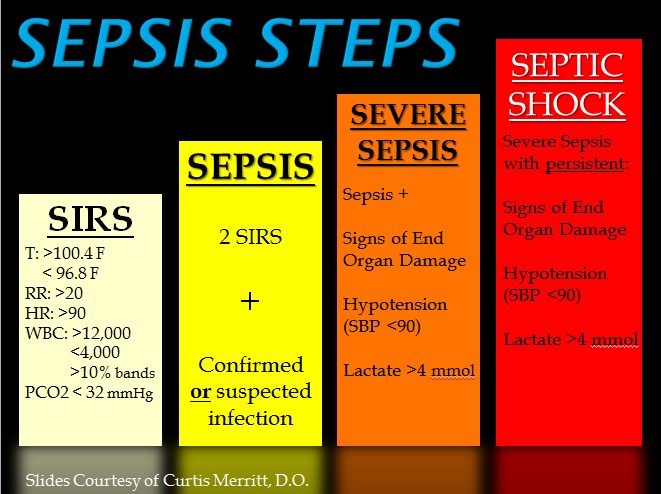Stage 4 Septic Shock
Welcome back to my series of emails addressing sepsis and why it is important to your cases. Feel free to email me with any questions you may have regarding the information I have provided so far or if you have questions regarding a case you are reviewing with one of these issues.
Today we are reviewing:
- Stage 4 – SEPTIC SHOCK
In our last few emails, we covered that nursing should be assessing every resident or patient for infection on a daily basis, shift by shift. We know that early detection of symptoms is the key for early treatment of any potential infection identified, and that if left untreated can start a cascade of systemic issues. We reviewed that Sepsis is present when two of the mentioned SIRS signs are present, but there is also a confirmed or suspected infection present and that Severe Sepsis is present when organs start to get impacted. Labs are also showing multiorgan impact with abnormal levels.

The last stage, Stage 4, Septic Shock is diagnosed when signs of end-organ damage are seen. So now you have: profound hypotension (low blood pressure) or hypoperfusion (decreased blood flow through an organ), lethargy, possibly nonresponsive, kidneys shutting down, with multiple other organs going into organ failure. Septic shock is a life-threatening condition in which time is of the essence for SURVIVAL. Patients in septic shock are often called the “sickest patients in the hospital,” as doctors, nurses, and other healthcare professionals work to save them from long-lasting complications or death.
If determined to be in Septic shock, a greater risk of mortality and long-term morbidity is recognized in the literature.
In severe sepsis, the outcome usually involves either very short hospitalization and death or prolonged hospitalization, again, sometimes ending in death, or if the patient survives, as severely impacted after recovery. Potential complications include permanent kidney damage, the development of tiny blood clots in the blood vessels which can block blood in extremity areas such as hands or feet, resulting in tissue death, gangrene and amputation. Some septic shock survivors must have the tips of fingers and toes removed, while others lose one or both legs, or even all four limbs.
ORGANS IMPACTED INCLUDE:
- KIDNEYS – decreased urinary output- noted as dark concentrated colored urine; possibly foul smelling; progressing to oliguria (lack of urine); Serum creatinine starts to elevate; Acute Kidney Injury develops
- BRAIN – cognition impacted, Glasgow score impacted; unresponsive
- HEART– increasing heart rate, sustained low blood pressure, decreased oxygen to the brain, heart
- LUNGS – most likely intubated and on a ventilator
- LIVER- no outwardly signs but developing jaundice
- LABS note multiple system abnormalities: Elevated white blood cell count; lactic acidosis; liver abnormalities; renal function; impacted oxygenation; maybe to point of causing a heart attack, increased heart enzymes
Key facts:
- When low blood pressure cannot be improved and continues as hypotensive (Low) despite intravascular (IV) volume repletion is called Septic shock.
- Septic shock is the most serious stage and presents patients with the worst survivability odds, some as high as 50% mortality.
- A study presented in 2019 looked at 1.5 million sepsis survivors in the United States and the researchers found that one out of every 100 survivors had an amputation within 90 days of their sepsis diagnosis. Most amputations were of the lower limbs.
- Up to 50% of sepsis survivors experience post-sepsis syndrome, long-term effects that can include severe muscle and joint pain, panic attacks, and decreased ability to sleep and concentrate which for attorneys– translates into PAIN & SUFFERING.
- About one-third of sepsis survivors return to the hospital within three months of their discharge. The most common causes are repeat infection or sepsis.
Keep a lookout in your inbox over the next couple of weeks for my emails which will talk about the different areas most noted for sepsis development. I think you’ll find them educational and informative, and ultimately helpful in your cases involving sepsis and death.
Call 508-292-2372 or schedule your case development review online with us today!
